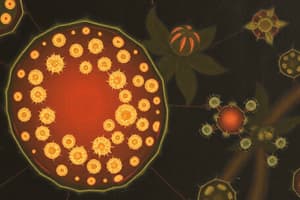Podcast
Questions and Answers
What is the definition of cytology?
What is the definition of cytology?
The branch of biology that studies the structure and function of cells.
Which of the following are fundamental properties of life? (Select all that apply)
Which of the following are fundamental properties of life? (Select all that apply)
- Flight
- Homeostasis (correct)
- Ordered complexity (correct)
- Cellular organization (correct)
Who invented the compound microscope and in which year?
Who invented the compound microscope and in which year?
Zacharias Janssen in 1590.
What did Robert Hooke observe using a microscope?
What did Robert Hooke observe using a microscope?
What does cell theory state?
What does cell theory state?
Life on Earth originated spontaneously in its early conditions.
Life on Earth originated spontaneously in its early conditions.
The __________ was responsible for storing and transmitting hereditary characters.
The __________ was responsible for storing and transmitting hereditary characters.
What advancements were made in cell biology during the 20th and 21st centuries?
What advancements were made in cell biology during the 20th and 21st centuries?
The first mammal created by somatic cell nuclear transfer was __________.
The first mammal created by somatic cell nuclear transfer was __________.
What are the two types of microscopes discussed?
What are the two types of microscopes discussed?
Flashcards are hidden until you start studying
Study Notes
Learning Outcomes
- Ability to explain the origin of life and key characteristics of living organisms.
- Definition and understanding of cytology.
- Knowledge of significant discoveries in cell biology and contributions by notable scientists.
- Discussion of cell theory and reasons for cell size.
- Familiarity with units of measurement for cells and cellular structures.
- Understanding the structure and function of compound microscopes, as well as differentiation between magnification and resolution.
- Comparison of electron microscopes and light microscopes.
- Importance of microscopes in advancing cell biology.
- Explanation of cell fractionation processes.
Origin of Life
- The Earth formed around 4.6 billion years ago from molten rock.
- Cooling of Earth led to the formation of chemically rich oceans from condensed water vapor.
- One hypothesis suggests life originated in these primordial seas containing ammonia, formaldehyde, methane, and other organic compounds.
- Life is believed to have arisen spontaneously less than 4 billion years ago.
- Theories on the origin of life: special creation, extraterrestrial origin, spontaneous origin.
Fundamental Properties of Life
- Cellular Organization: Living things are structured at a cellular level.
- Ordered Complexity: Biological organisms exhibit a complex arrangement of components.
- Sensitivity: Capacity to respond to environmental stimuli.
- Growth, Development, and Reproduction: Ability to grow and produce offspring.
- Energy Utilization: Organisms consume energy to sustain life functions.
- Homeostasis: Maintenance of stable internal conditions.
- Evolution: Capacity for change and adaptation over generations.
Cytology
- Cytology studies the structure and function of cells, derived from the Greek "kytos" (container) and "logy" (study).
- Key historical advances in cell biology:
- 1590: Invention of the compound microscope by Jansen.
- 1665: Robert Hooke uses the term "cell" to describe units in cork.
- 1650-1723: Leeuwenhoek observes unicellular organisms, noting bacteria.
- 1831-1839: Robert Brown identifies nuclei in plant cells; Schleiden and Schwann propose cell theory.
- 1840: Virchow concludes that cells arise from pre-existing cells.
- 1880-1898: Discovery of organelles such as chloroplasts and mitochondria.
- 1930s: Invention of the electron microscope by Ernst Ruska.
- 1953: Watson and Crick define the structure of DNA.
- 1996: Dolly the sheep is created through somatic cell nuclear transfer.
- 2000: Surge in stem cell research and sequencing of the human genome.
Cell Theory
- Formulated through the work of Schleiden (plants) and Schwann (animals).
- Modern cell theory principles:
- All organisms are made of one or more cells; metabolism and heredity occur within these cells.
- Cells are the basic units of organization in living systems.
- New cells are produced only through the division of existing cells.
- Current understanding holds that no new cells arise spontaneously today; all cellular life descends from pre-existing cells.
Studying That Suits You
Use AI to generate personalized quizzes and flashcards to suit your learning preferences.




